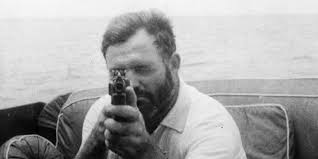
When one delves into that of that humanity’s universally lauded writers, one frequently consistent name presents itself – Ernest Hemingway. However, in this day and age of progressiveness and inclusivity, one can’t shed the underlying question as to whether or not the 20th century’s greatest writer bears any relevance or place in today’s world.
Great individuals can be considered so through producing a flawless body of work and living an eventful and/or inspiring life; hence, in regards to the latter, ‘great’ would be an understatement when contextualising the life and works of Hemingway. The late American writer, who gave us such classics as To Whom the Bell Tolls, Farewell to Arms, The Old Man and the Sea and The Sun also Rises to name a few, is my personal favourite as of writing this – so please excuse my blatantly overarching bias. Hemingway’s understated style (which he coined the iceberg theory) was and remains instantly recognisable and it led to a literary revolution in American literature, of which its ripples are still felt today as he continues to influence one generation after the next.

Alas, the likes of Hemingway, who died in 1961, has not been without his fair share of criticism. Many make an active (and a arguably deserved) case that the values and views that the man transcribed are, to some, outdated yet characterised with aspects which, to many, are racists, overtly oozing with an unpleasant machismo and misogynistic, one may find many other isms peppered throughout his extensive work, however. Of course, a notable argument is that Hemingway was of his time – a mouthpiece of a bygone generation, yet many argue that this alone excludes any appreciation of Hemingway in this day and age. But I think otherwise.

A recurring theme of Hemingway’s writing is the fine balance we all tread between life and death. Through his characters, be they old fishermen or adventurous soldiers or bullfighters, we are encouraged to grab life by horns, to live and die for something greater. Throughout his life, Hemingway actively tangoed with death, to him to be faced with such a looming presence revealed the true nature of a person, throughout his works he humiliates and vilifies acts of cowardice in the face of death; to him, death is to be embraced, understood and played with, I personally believe Hemingway was that of an adrenaline junkie and that war was a place where death was most prevalent. Whilst his works are laden with simplified and romantic depictions of war, I find his ethos of life and death to be an inspiration to which all ought to strive for; to really live a life worthy of living – a concept that seems scarce in this day and age.
Hemingway’s style, whilst at surface level may seem bare, really is something unlike most writing. There is an abundance of room to read between the lines, to really ponder and think about how the character thinks and feels, and it turn – as these are often extensions of the writer himself – allow us to better understand Hemingway. His bluntness lays before us a passionate, yet emotional man with the ability to recognise beauty in any person or place. One of my favourite books of his was a posthumous release – A Moveable Feast; as a biographical piece combined with his honed and perfected use of words we are really given a deep and revealing look into his early life as a writer, surrounded by other legends of the Lost Generation like F. Scott Fitzgerald and Gertrude Stein.

Admittedly, after Hemingway’s death, the man was buried under a veil of revisionist criticisms which attacked his livelihood and writing. Yet, as his friend Orson Welles once said “the sun is rising for him again” after a decade or so after his passing, I feel we tend to see a revision in appreciation for Hemingway every ten or twenty years. Whilst he may not be at the peak of popularity nowadays, I find that he is an important and revered figure we ought to hold onto. Whilst his overt masculinity could, to some readers, be considered uncomfortable I actually feel that, as a form of escapism, many men rush to cling to Hemingway as we undergo a crisis of masculinity in 21st century society. Hence, I believe that Hemingway’s shear adventurism, confidence and eclectic image will only draw his flame larger than ever before as he serves as an icon of not only good literacy but as something to aspire to be.

